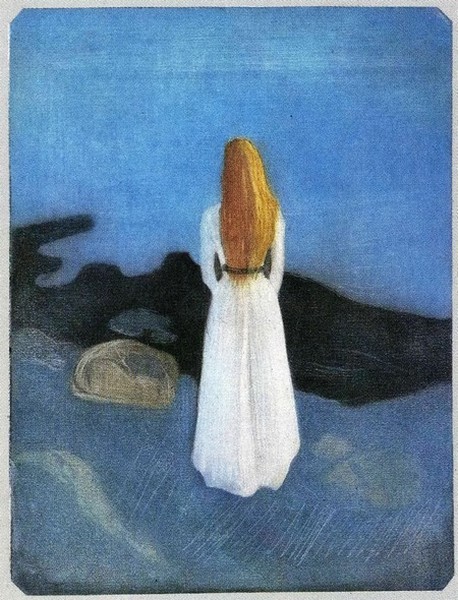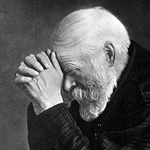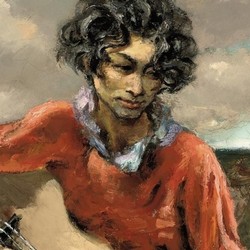
In the 1880s, Antonín Dvořák was an accomplished composer who was well-known not only in Germany but also in other parts of Europe and the United States; the premiere of his Stabat Mater in London in 1883, made him an acclaimed and claimed author in the Anglo-Saxon world.
Between late 1887 and early 1888, he wrote a four-song notebook, Opus 82, which he gave to publisher Simrok, apparently to apologize for a previous misunderstanding. All four songs were based on texts by the German poet Ottilie Kleinschrod, also known by the pseudonym Otilie Malybrock-Stieler, who in 1887 published her first volume of poetry, Lyrische Gedichte und Übertragungen nach böhmischer Kunst- und Volkspoesie. The collection was divided into four parts. The first three were original poems by the author, and the fourth part was German versions of Bohemian and Moravian poetry.
A little more about Ottilie Kleinschrod, a very interesting lady, was on my mind, but since I wouldn't want to go from a series of short entries to a long one, I wrote it down in my blog notebook for later. For the moment, let’s say that the poem of the song that we will listen to this week, the first of Dvořák’s collection, belongs to the first part of Kleinschrod’s book, Liebe. In Lasst mich alleine [Leave me alone], the poetic voice speaks to us about the emotion, joy, fears, and hopes of a love that is just beginning. She wants to be alone with her feelings.
With his gift for melody and immersed in Late Romanticism, Dvořák composed a song in which emotion ranges from containment to ravaging. It is a song composed of two musical stanzas; the first covers the first three stanzas of the poem, and the second, the last two plus a repetition of the last. Additionally, to conclude the two stanzas, Dvoák incorporates three repetitions of the initial words. The first two poetic stanzas within each musical stanza have very similar music, only the third is more different, so when we listen to the song it drags us over and over again in a beautiful melody.
This song, which we will hear performed by Angelika Kirchschlager and Helmut Deutsch, is little recorded and even less performed in concert, and would be as unknown as his beautiful and unfortunate companions of Opus, if not because...
Let's go back a couple of decades, until 1866. Dvoák was then twenty-five years of age and earned a modest income by playing the viola in the orchestra of Prague's foremost theatre. To supplement his income, he taught piano lessons to the five daughters of the Čermák family, including seventeen-year-old Josefina and ten-year-old Anna. Josefina worked in the same theatre as Antonín; she had made her debut at the age of fifteen and was already famous. The young man fell in love with her and proposed to her, but she rejected him; whether it was because he was unable to provide her with the economic security expected from a husband, because she aspired to someone socially better, or simply because she was not in love with him. In 1873, Dvořák married Anna; in 1877, Josefina retired from the stage to marry a count, and Antonín was their best man. Both marriages were happy, and the two couples maintained a good friendship beyond the usual family relationships.
In the winter of 1894, when the Dvořáks lived in New York City, they received a letter from Josefina that worried them greatly. She had always had delicate health because of a weak heart, but she told them that she couldn't even get out of bed now. And then, the composer, who was writing his beautiful cello concerto, made the soloist and orchestra sing, in the second movement, the main melody of Lasst mich allein, a song that Josefina especially liked. The concert was completed in February of the following year and in spring, the composer and Anna returned home; they missed their life there, especially their children, who had stayed with their maternal grandmother, and were upset by the health of their sister. And with good reason, as Josefina passed away a few weeks after their arrival in Prague. Dvoák then changed the finale of the concerto to make the orchestra evoke the same song.
And this is how, indirectly, Lasst mich allein is often heard in concert halls. I will also leave you an excerpt of the Adagio of the concert, in which the song is heard, performed by Jacqueline du Pré and the Chicago Symphony Orchestra conducted by Daniel Barenboim. It has made me feel sorry for cutting it, but here is the whole movement.
Laßt mich allein in meinen Träumen geh'n,
Stört mir die Wollust nicht in meinem Herzen!
Laßt mir die Wonne all', laßt mir die Schmerzen,
Die mich erfüllen, seit ich ihn geseh'n!
Laßt mich allein! Verscheucht den Frieden nicht
In meiner Brust mit euren lauten Worten!
Daß ich ihn seh' und höre aller Orten:
Laßt mich allein mit seines Bildes Licht.
Fragt nach dem Zauber nicht, der mich erfüllt;
Ihr könn't die Seligkeit ja doch nicht fassen,
Die seine Liebe mich hat fühlen lassen,
Die Liebe, die nur mir, mir einzig gilt.
Laßt mich allein, allein mit meiner Last
Von heißer Qual, von loderndem Entzücken;
Und sollt' es dich, du armes Herz, erdrücken:
Du trägst allein, was du vom Liebsten hast!
Laßt mich allein in meinen Träumen steh'n!
Er liebt mich ja! Laßt mir den tiefen Frieden,
Den dieses Wort mir gab, von dem geschieden,
Die Seele müßt' in Sehnsucht untergeh'n.
Leave me to walk alone in my dreams,
Do not disturb the ecstasy within my heart!
Leave me all the rapture, leave me the pains
That have filled me ever since I saw him!
Leave me alone! Do not dispel the peace
Within my breast with your loud words!
That I may see him and hear him everywhere:
Leave me alone with the light of his image.
Do not inquire after the magic that fills me;
In any case, you could not comprehend the bliss
That his love has allowed me to feel,
The love that is for me, only me alone.
Leave me alone, alone with my burden
Of fervent agony, of blazing rapture;
And if it should crush you, my poor heart:
You bear only that which you received from the beloved!
Leave me to stand alone in my dreams!
For he loves me! Leave me the deep peace
That this word gave me; separated from that [word],
My soul would have to perish in yearning.
(translation by Sharon Krebs)


















Comments powered by CComment